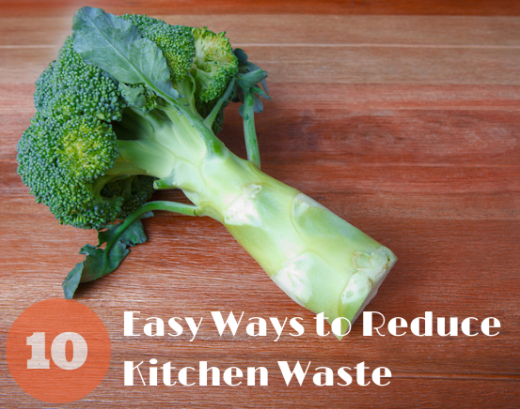10 Easy Ways to Reduce Kitchen Waste
5 min read
Nature Moms Blog –
According to a research, the average kitchen wastes approximately $1000 in food per year. Roughly 40{533314f2540bdd33bbc04377fd32ff805adcd56cc20929d47e9b088aa1bb02ce} of all food produced worldwide ends up in the garbage. Think of how many hungry people could be fed if we cleaned up our act and actually used what we purchased and thus only purchased what we actually needed. Our budgets would be immediately helped by making a few changes and wasting less food. I know personally I cringe at the idea of throwing away $1000 a year. I can think of many ways I would rather spend that money.
Food waste also impacts the planet because we are wasting resources to grow food that we allow to rot and then eventually throw away. Just think about all the energy used to grow crops and the taxation of the soil. Throwing food away is highly wasteful and hurtful to our planet.
Here are a few very simple ways that you can avoid unnecessary waste in the kitchen…
Don’t buy food without plan: Probably the biggest mistake we can make when grocery shopping is buy food without a meal plan of some sort. We need to know when we buy something how and when it will be used. Sometimes we buy things on impulse and think will figure out later what to do with it. Perhaps those tomatoes look ultra appetizing or asparagus is in season, so you buy. Then they end up sitting in the frig or on your counter to rot because you had no clear idea what you would do with them. It is essential to make plans before buying so that everything is used per your plan and does not get wasted. 20-30 minutes spent planning a menu and ingredients list will save you money and it will reduce waste.
If meal planning is not your thing. Outsource!! I like eMeals. They even have a paleo meal plan.
Buy Foods At the Right Time: This is part of the menu plan. If you buy a bunch of avocados because they are on sale then taco night needs to be within 2-3 nights of purchase, not a week later. Coordinate your menu plan with what is on sale, what is in season, and what is available at your local farmer’s market and then use them up within that week.
Buy Less Food: Some people like to buy in bulk and/or buy most of their of food at once. Others like to make several shopping trips a week and buy a little bit at a time. The latter method will be more advantageous if food waste is a problem for you. Lots of groceries means you have to be very good at prioritizing and planning so that nothing goes to waste. If that is you then congrats…if not change your shopping habits and pick up groceries a couple times a week rather a couple times a month.
Organize the Kitchen: A big food waste culprit is a disorganized and cluttered kitchen. If your frig is stuffed to capacity and your pantry is overflowing how do you even know what you have in there??!? Once a month do a pantry overhaul. Once a week do a frig clean-out. This keeps your inventory fresh in your mind and it allows you to see what you need to use up. Make a list of the stuff you need to use pretty quickly and build your menu plan around that.
Store Foods Appropriately: If you buy apples by the bushel then you need to know how to store them so that they last. Wrapping the best apples in newspaper and keeping them in baskets or a boxes in a cold place for instance. Potatoes and onions are usually kept in well ventilated wicker baskets. I like these.
Also some fruits and veggies emit high levels of ethylene gas and can cause your other produce to go bad more quickly so make sure to keep them separate. Don’t keep your peaches and apples anywhere near the greens and celery. Do a bit of research on the foods you buy and find out how to store them properly.
Use Up Leftovers: Some families have a night set aside to enjoy leftovers so that they can use up the food in their frig/freezer before it goes bad. This may mean that your meal includes a mish mash of different foods but you aren’t allowing good food to go to waste. Just call it buffet night!
I also like to pack leftovers in school and work lunches and usually design our dinner menu plan around meals that will work well as lunches the next day.
Freeze Food Before It Spoils: If the food in your frig or on your countertops is looking pretty sad make sure to freeze it before it goes bad. Bananas that are browning can be peeled and frozen for fruit smoothies or for baking. Apples that are starting to go bad get turned into crockpot applesauce, which is then frozen. Greens that are not looking terribly fresh get frozen for green smoothies or for homemade vegetable stock. Small bits of meat get frozen for use in frittatas. Small bits of veggies can be frozen and used later in stir fry or casserole.
Buy Dried Foods: If you have a problem using up mushrooms before they go bad then make a switch to dried mushrooms. I love using dried mushrooms and wood ears in soups. Yum! They last a long time in the pantry and you don’t have to worry about using them up fast. Fruit is another thing you can buy dehydrated or dehydrate yourself (to use up seasonal fruit stores). It can then be used in smoothies, baked goods, snacking. etc. If your kids let bananas go to waste but they love dried banana chips, think about making a switch.
Don’t Toss It – Compost It: If the food is too far gone make sure to compost it and turn it into black gold for your garden and your houseplants. If you don’t garden, compost it anyway…I am sure that many folks would love to take the compost off your hands when it is ready.
Consider the Packaging: Waste in the kitchen isn’t just about food. What about all of the packaging waste that ends up in the landfill?? To mitigate this buy food without packaging whenever possible…its usually healthier food anyway. Buy fresh broccoli rather than frozen, buy ingredients to make bread rather than buy it in bags. Choose packaging that can be recycled before any that cannot be recycled. Bring your own glass jars and shop the bulk bins for grains, beans, cereal, etc. Be intentional when it comes to what you purchase.
You can also go a step beyond…
Be a Freegan: Freegans look for free food (usually in grocery store dumpsters) that has been discarded. The food is usually still perfectly good but it is thrown out on freshness dates that are very conservative. If you want to explore this option read my post on Freeganism or watch the movie Dive. It’s a great film!
(c) Nature Moms Blog – Read entire story here.






